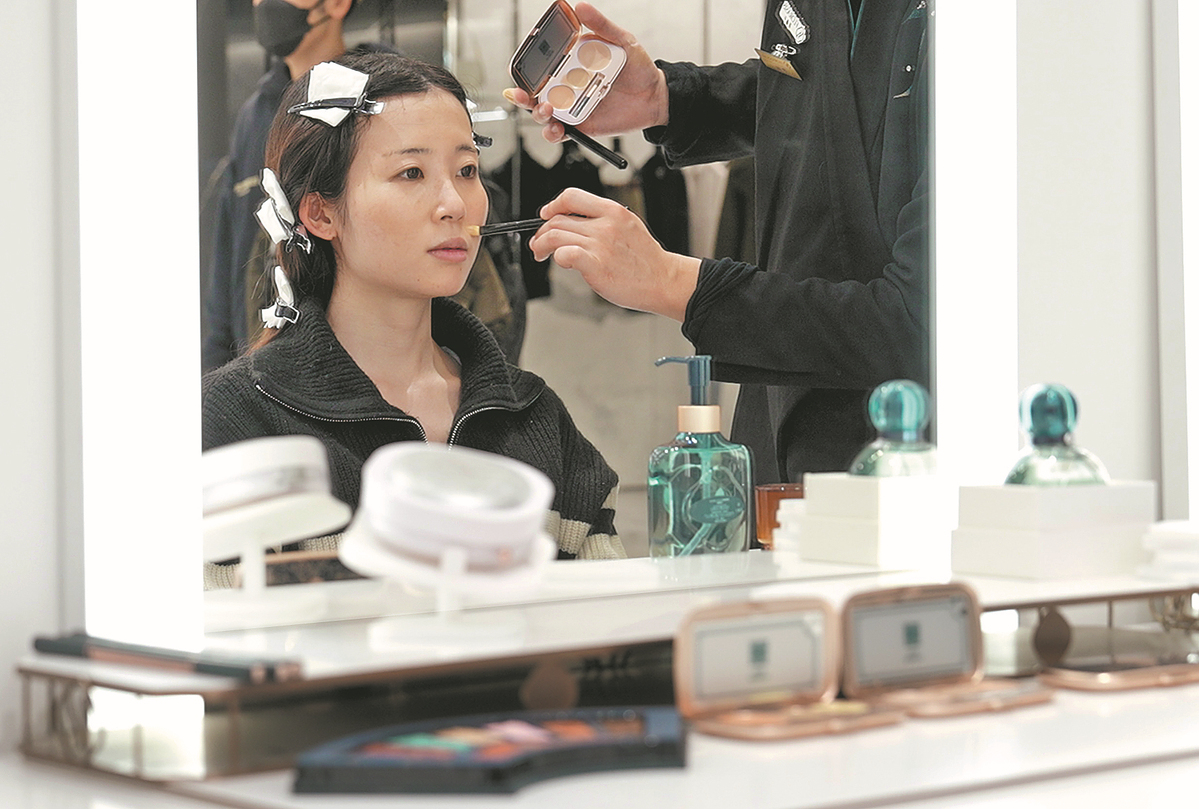
A visitor tries on Florasis cosmetics at a store in Tokyo on Jan 27. [Photo/China Daily]
Huaxizi, also known as Florasis, a Chinese beauty brand with cultural and aesthetic attributes, has further accelerated its pace of going global by launching a new flagship store in Tokyo in late January, and it plans to continuously expand its presence overseas.
The Hangzhou, Zhejiang province-based company opened the new store at Ginza Six, a high-end shopping mall and the largest commercial facility in Ginza district on Jan 27, becoming the first Chinese cosmetics brand to operate a flagship store in the popular Tokyo district.
The latest move follows the company's opening of a counter in Paris at Samaritaine department store in September. Florasis became the only Chinese beauty brand to operate a physical shop in Europe, and it has seen rosy sales at the department store so far.
Back in 2021, Florasis began to sell its products in the Japanese market by launching an online store on Amazon. Later, it has been selling through local offline channels such as at a Cosme store in Osaka, Japan, and repurchasing rates have been high.
Florasis said many Japanese consumers prefer cosmetics that are made based on flowers and Chinese herbal medicines. Last year, its sales revenue in Japan accounted for 40 percent of the brand's total overseas sales.
In the past few years, an increasing number of Chinese brands with local cultural attributes and innovative vibes have expanded their presence overseas, including domestic beauty brands Proya, Judydoll and Perfect Diary.
In the first 11 months of 2024, the export volume of Chinese beauty products and toiletries reached 1.19 million metric tons, up 18.2 percent year-on-year. Export value came in at $6.53 billion, up 9.4 percent on a yearly basis, according to the General Administration of Customs.
"The Chinese cosmetics sector is embracing significant growth opportunities. We should actively promote high-end, digital and green transformation of the industry and support technological innovation, product upgrading and the enhancement of domestic brands," said Cao Xuejun, an official with the consumer goods industry division of the Ministry of Industry and Information Technology.
Florasis said over the past four years, it has built a good consumer base and reputation in Japan. The opening of the store in Tokyo reflects the international market's high recognition of the brand.
"We hope to show the value of Chinese brands in overseas markets and allow more international consumers to experience China's beauty products through offline channels," said Ren Gangrui, co-founder of Florasis.
Florasis has integrated Chinese ethnic intangible cultural heritage aspects such as ceramics, leather carving and embroidery with modern crafts, and applied such elements to the design of beauty products. The company has also been focused on the research and development of materials, components and packaging, and its lab in Hangzhou covers an area of 7,000 square meters.
Located in Ginza Six alongside a large number of international brands, Florasis believes its competitive advantages lie in unique cultural elements, high qualities and R&D capabilities.
"I like the combination of traditional craftsmanship with makeup products. This has helped me better understand Chinese culture, and I would like to buy some products for my family and friends," said a Spanish consumer named Selina.
Currently, Florasis sells products to over 110 countries and regions through its official website, different e-commerce platforms and offline channels.
zhuwenqian@chinadaily.com.cn